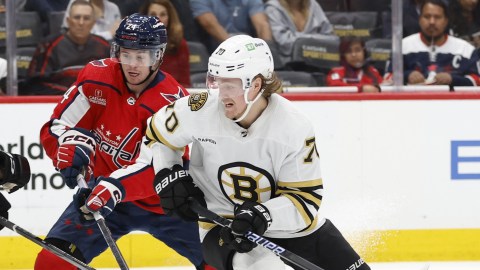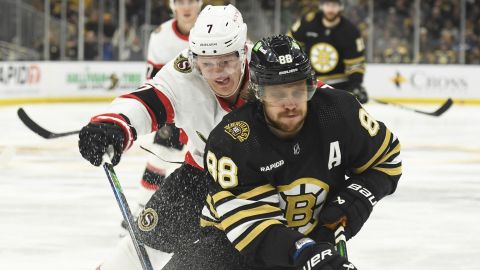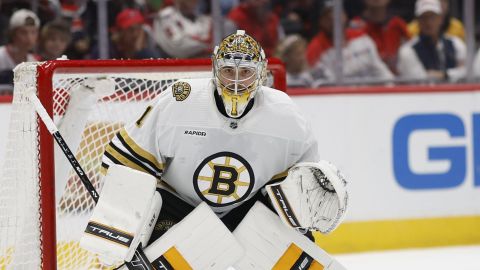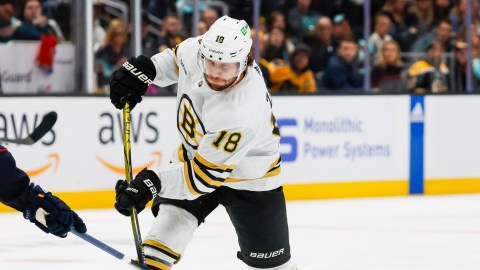It used to be an annual rite of fall. As sure as the leaves would change color, New Englanders could count of at least one high-profile Bruin to miss camp holding out for a new contract.
Kyle McLaren held out until November in 1998. Byron Dafoe missed the first 12 games of the 1999-2000 season. Joe Thornton and Sergei Samsonov missed camp the following year, while Anson Carter eventually forced a trade to Edmonton in November. In 2001, it was Jason Allison that ended up traded in late October after a contract standoff. Then McLaren came back for seconds in 2002, this time staying home until January, when he was finally dealt to San Jose.
Even after the lockout, Nick Boynton and Andrew Raycroft each staged holdouts in 2005. Raycroft relented after missing the start of camp, while Boynton’s holdout dragged into the regular season as he missed the first five games. Both players were eventually traded away the following offseason.
But ever since Peter Chiarelli took over as general manager in 2006, peace has prevailed over the labor wars previous administrations had seemingly embraced. Long gone are the days of Harry Sinden telling Joe Juneau to learn to yodel when the forward threatened to sign in Switzerland without a guaranteed one-way deal from Boston in 1992.
Instead, the Bruins have had few issues getting their players signed and in camp on time under Chiarelli. The lone exception came last year with Phil Kessel, who technically was an unsigned restricted free agent and not a holdout when he remained without a deal at the start of camp. While that situation hung over the club like a dark cloud throughout the summer, Chiarelli didn’t let it linger into the season. He traded Kessel to Toronto early in camp for a trio of draft picks, with the first of those yielding potential franchise forward Tyler Seguin with the second overall selection this year.
This year, Chiarelli has just about everyone in place once again. Only Seguin remains unsigned, but with the rookie salary cap in place, negotiations to finalize a max contract with him should be fairly straight forward.
Chiarelli did have to go to arbitration to settle on a $2.2 million price tag for Blake Wheeler, a process the Bruins GM prefers to avoid because of its often acrimonious nature. It was just the second time a Bruin went to arbitration during Chiarelli’s tenure, but both sides came out with no complaints and Wheeler even praised Chiarelli’s professionalism in the hearing.
The change in approach to signing players under the current regime stems from several sources. Chiarelli’s own background as a player agent before moving to the front office in Ottawa gives him a different perspective than previous managers. Having been on the other side of the bargaining table affords Chiarelli a better understanding of the process from the player’s viewpoint, making it easier to reach an accord.
Having the salary cap in place has also altered the Bruins’ methods. While salaries continue to soar as the cap rises, there is still a limit in place and the Bruins no longer have to be the standard bearer for trying to hold back that tide as they were often perceived to be in the past.
There was also a realization after the dark days in the middle of the past decade that a change in culture — a phrase Chiarelli often uttered himself — was needed to get the Bruins moving in the right direction. They needed to find ways to attract players and convince them to come here after back-to-back seasons in the Northeast Division basement. And they needed a less contentious approach to keep their talent here.
Chiarelli laid out the basics of his approach in his introductory news conference back in 2006.
"I want to introduce a new, fresh culture for this organization," said Chiarelli. "I want players to want to play here. I want players to want to stay here. I want players to want to move their families here. I want them to be proud. I want them to be proud to have the Boston Bruins logo on their chest.
"In my experience as an agent, I got to know the concerns of the players," added Chiarelli. "There are on-ice concerns and there are off-ice concerns that are truly valid. Sometimes they get lost in translation. In my experience with management, you become part of a team. You want to win. That’s your main objective — to win — and sometimes you lose sight of these other things that the players are thinking. I think because I’ve experienced both, I will be able to draw them both together and unite a common, strong bond towards a winning tradition for the Boston Bruins."
There is a price that comes with such an approach. The Bruins are feeling the sting of deals that may have been overpayments, as the club now faces some serious cap issues with generous deals to Andrew Ference and Tim Thomas among others on the books. There still is talk of who might not be here when camp opens, though now that comes from the team having spent too much and needing to ship players out for cap reasons, rather than players holding out for better terms.
Still, as he enters his fifth season in charge of the club, Chiarelli has succeeded in changing the culture and the perception of the club. There’s plenty left to be done, as that Stanley Cup drought is now at 38 years and counting, and last year’s playoff collapse remains a fresh open wound. But it is refreshing that Bruins fans can hold out hope for better things on the horizon, rather than just worry about the next round of annual holdouts.



